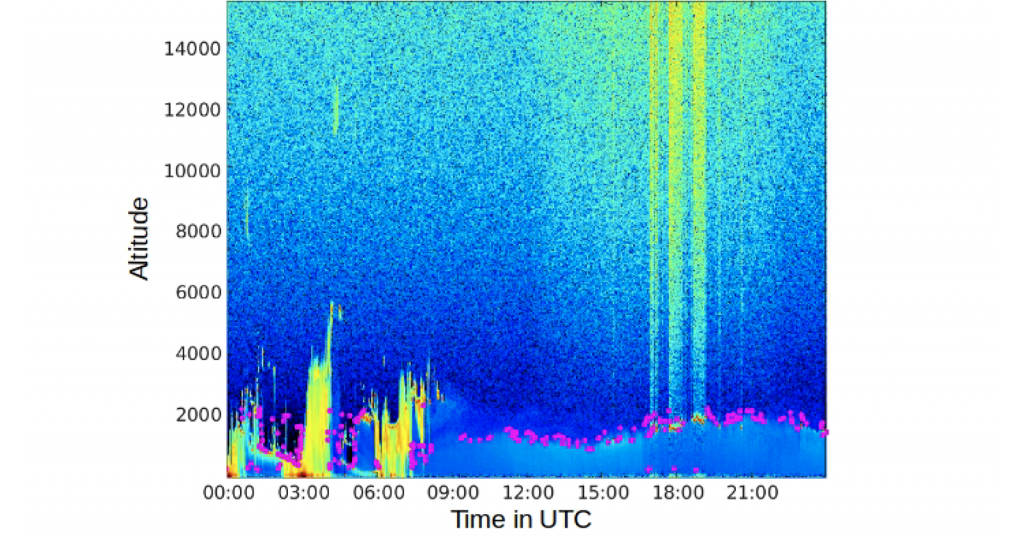 24 hour LIDAR backscatter profiles and PBLH points generated from image machine learning system
24 hour LIDAR backscatter profiles and PBLH points generated from image machine learning systemThe Infusion of Machine Learning as a New Methodology for the Physical and Social Sciences
Dr. Jennifer Sleeman
CSEE, UMBC
1:00-2:00 pm ET, Wednesday, March 24
Online via WebEx
Machine learning has made improvements in many areas of computing. Recently attention has been given to infusing social science methodology with machine learning. In addition, the physical sciences have begun to embrace machine learning to augment their physical parameterization and to discover new features in their computations. I will describe my work that relates to these new emerging areas of research. I will first describe our machine learning research efforts related to understanding the changing role of climate and its effects on society. I will describe how this methodology was also applied to understanding cyber-related exploits. As part of this work, I developed an expertise in generative modeling, which led to a patent in generative and translation-based methods applied to imagery. These ideas were fundamental to a contribution in machine learning using quantum annealing. Quantum computing holds promise for deep learning to reach model convergence faster than classical computers. I will describe work related to developing a new hybrid method that overcame qubit limitations for image generation.
In addition, I will describe my current work related to machine learning for the Physical Sciences. As part of a multi-disciplinary team from UMBC and other universities, my current work explores ways to augment and replace existing physical parameterizations with neural network based models. I have led a research effort to calculate the planetary boundary layer’s height (PBLH) used for ceilometer-based backscatter profiles and satellite-borne lidar instruments. This work addresses the largest uncertainty in climate change, namely the role of aerosols (dust, carbon, sulfates, sea salt, etc.). We employ a novel method that includes a deep segmentation neural network that uses near-time continuous profiles forming an image to determine boundary layer heights. This method overcomes limitations in wavelet approaches which are unable to identify the PBLH under certain conditions. I will also give a preview of two efforts related to Long Short Term Memory (LSTM) neural networks related to learning PBLH changes over time. These research efforts result from collaborations with two students in the UMBC CSEE department and are being published and presented at the AAAI 2021 Spring Symposium on Combining Artificial Intelligence and Machine Learning with Physics Sciences.
Dr. Jennifer Sleeman is a Research Assistant Professor in Computer Science at the University of Maryland, Baltimore County (UMBC). Her research interests include generative models, natural language processing, semantic representation, image generation, and deep learning. Dr. Sleeman received the prestigious recognition of being a 2019 EECS Rising Star. She was also recognized in 2017 as one of the best Data Scientists in the Washington, DC region by DCFemTech. She defended her Ph.D. thesis, Dynamic Data Assimilation for Topic Modeling (DDATM) in 2017 under Tim Finin and Milton Halem. Her thesis-related work was awarded a Microsoft “AI for Earth” resource grant in 2017 and 2018 and also won the best paper award in the Semantic Web for Social Good Workshop presented at International Semantic Web Conference in 2018. She was an invited guest panelist at the AI for Social Good AAAI Fall Symposium in 2019 and was also an invited keynote speaker at the Sixth IEEE International Conference on Data Science and Engineering (ICDSE 2020), where she presented her ideas related to AI for Social Good and Science. She is an active research scientist in generative deep learning methods for which she holds a patent. She has over 12 years of machine learning experience and over 22 years of software engineering experience, in both academic and government/industry settings. She is currently funded by NASA and NOAA (PI). She also teaches Introduction to Artificial Intelligence at the University of Maryland, Baltimore County (UMBC) and currently mentors two Master’s students
The post talk: Machine Learning: New Methodology for Physical & Social Sciences, 1pm ET 3/24 appeared first on Department of Computer Science and Electrical Engineering.





